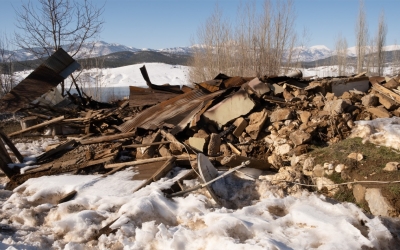Syria earthquake: Volunteer who goes where others fear describes the front line
A volunteer rescue worker in rebel-held Syria has described the devastation she saw while working on the front line, and said the 6 February earthquakes shook homes with greater force than any government-led bombing raid over the past 12 years.
For more than two weeks, Soraya Tamr has been trying to rescue those still trapped under the rubble in rebel-held Idlib after two massive earthquakes tore a path of destruction through southern Turkey and northern Syria.
New MEE newsletter: Jerusalem Dispatch
Sign up to get the latest insights and analysis on Israel-Palestine, alongside Turkey Unpacked and other MEE newsletters
Her colleagues, members of the White Helmets, have been pulling men, women, and children out of bombed buildings for years, but normally, only from one or two sites at a time.
But since the 7.8 and 7.5 earthquakes, they've had to deal with approximately four million people directly affected by the disaster but with even fewer supplies than usual.
"As the earthquake began, we rushed out of the house, and I could hear the voices of neighbours and children as they hurried out of the buildings," Tamr told Middle East Eye.
"All the buildings started to collapse. The state of panic was surreal. You realise then that you are the only strand of hope they have left. You cannot stand helpless. You have to act."
Drawn from Syrians across rebel-held regions, the White Helmets - known formally as the Syrian Civil Defence - began helping people as the war escalated in Syria in 2012 and have now gained worldwide fame as the rescuers who go where others fear to tread.
Syrian President Bashar al-Assad and his backers, including Russia, have dismissed the group as western-sponsored propaganda tools and have even claimed they have staged some rescue operations.
Those allegations - which the group says are part of a disinformation campaign aimed at discrediting them - have led the White Helmets to set up a polished media operation drawing attention to the plight of those living in the region.
'You have to be strong'
For Tamr, the rescue efforts in rebel-held areas were made difficult primarily due to the slow UN response following the quake, but also due to a decision to seek authorisation from Assad for the delivery of aid through additional border crossings with Turkey.
Local rescue teams have said that hundreds of civilians may have died in the first three days after the first tremor due to the absence of life-saving assistance.
Tamr said that despite being able to save some, each rescue came with the news that more and more had died.
She recalled one instance where she rescued a girl named Aya only to find that her parents had perished under the rubble.
"When you feel the joy of rescuing a person, it feels great, but shortly after, you feel the pain of saving the only surviving child of their family. The rest of the family are all dead, their lives were lost," Tamr said.
"Feelings of sadness try to overtake you, but you have to be strong in order to face the disaster."
As the search and rescue effort in northwest Syria winds down, Tamr said she held herself responsible for not being able to save more people.
"I want to send a message to all the people who asked for our help but we couldn't provide it. They asked us to rescue their families and children from under the rubble, but death was closer and faster to them than us," she said.
"We apologise to every person who died in the earthquake and that we were unable to help or save them."
Middle East Eye delivers independent and unrivalled coverage and analysis of the Middle East, North Africa and beyond. To learn more about republishing this content and the associated fees, please fill out this form. More about MEE can be found here.







